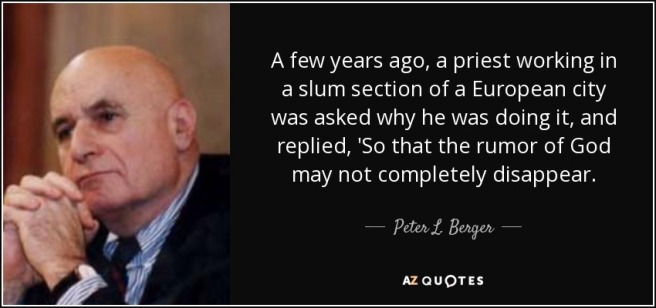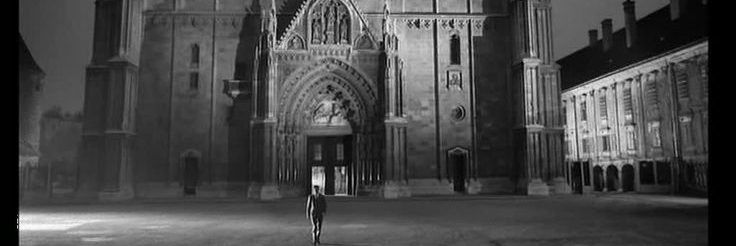
Sociologist Peter Berger (A Rumor of Angels, The Heretical Imperative) provided this insight in a 2006 lecture on “Lutheran Identity in America”:
This spirit [of Lutheran freedom] should above all give one a certain distance from one’s cultural context and thus protection against becoming captive to it. But in the current American situation, it seems to me that the two central ideas of Lutheranism could provide guidance . . . both for a critique of the current situation and for a constructive stance.
1. A conviction that salvation occurs sola fide and the much-maligned doctrine of the Two Kingdoms, which of course rests on the distinction of law and gospel. Those are two core Lutheran ideas, and I think they are tremendously important if there is to be a Lutheran identity and Lutheran witness in this socio-cultural context, and political context. Now in this perspective, I think, all . . . sectors of the current cultural and religious scene can be subsumed under the category of works righteousness, as a violation of the anthropological understanding that the Christian as simul justus et peccator. How so?
Well . . . against the tepid moralism and the utilitarian psychologism of mainline Protestantism, the Lutheran witness would reiterate the core of the gospel, which is not a new law, however tolerant or relaxed, but the triumphant breaking in of redemption into the world. The gospel does not provide a new moral code or a therapeutic spirituality. . . .
[I]n Arabic, the same word din (deen) applies both to religion and to law . . . so if an Arab asks you, “What is your religion?” in fact he is asking, “What is your law?” And I think the Christian answer is, “I don’t have a law.” This is not what the gospel is. The gospel does not provide a new law or a therapeutic spirituality of some sort. Rather it testifies to a cosmic transformation inaugurated by the Resurrection of Christ and moving toward its ultimate realization in his coming again. . . . Of course, this does not imply an antinomianism in which everything is permitted. Let me refer here to another Lutheran idea, that of the Three Uses of the Law. But it sharply relativizes the moral codes of any society or any age.
Berger self-identifies as a Lutheran, but also as a theological liberal (and politically mildly conservative), so you may not be able to embrace his entire argument. I dare say, the use of historical criticism in studying the Scriptures may have been an act of intellectual or academic freedom (certainly Luther would have found it strange to attach his name to it); but it also brought with it certain presuppositions that did as much harm as good in understanding how the Scriptures were intended to be read by their human authors, to the extent such an investigation could prove fruitful or even possible. It is one thing to say that the gospel writers were rooted in a certain cultural context; it’s quite another to reduce them to it.
Found on the Gnesio Lectures & Sermons page.

I seem to perceive dear Anthony that you resonate to a certain part of what he says and at the same time see a serious error. I agree. I suggest that the resonant truth of what he says and also the error is right here:
This part is exactly right. Why? One must see the Doctrine of Two Kingdoms as Luther saw it and not as Rome and many modern Lutherans see it.
So this will be a sort of long response. Forgive me for that. I hope I can justify my long response.
The basis for the Two Kingdoms doctrine is found , for Luther, in Romans 8 and the distinction there between flesh/body versus spirit or Spirit. It is important to note that this doctrine, for Luther and the Lutheran Confessions, is not found in Jesus words “render unto caesar…”. That reading would make Two Kingdoms into more a theory on the relationship between church and state. This is one of two popular understandings and it would be a wrong one.
Note that in Romans 8 all things that are flesh/body will perish and the spirit will live on in the resurrection. So the question becomes this one: “In all we can see and do in our bodies, what are those things that will endure into the resurrection and what are those things that will die and perish in our physical death and at the end of the age?” That is the question that Two Kingdoms resolves and gives us clarity. I am saying Luthers version of Two Kingdoms, not the church vs state version or the Roman Scholastic version of Two Kingdoms. So you must ask : then what is the Lutheran Two Kingdoms doctrine?
So it is important to note that there are 3 versions of Two Kingdoms floating about. Just as there is a Lutheran version of ‘natural law” where natural law= reason and reason alone, and then ….there is a Roman Catholic Scholastic version of Natural Law that finds a “telos” (read eternal life) in the Law that is something other than death, always being accused and always being killed! Lutherans reject the scholastic version of Natural Law because we believe that ALL Law always has the “telos” or end or purpose, alone, of killing and accusing. That alone is the eternal “telos” of the Law. There may be life there or earthly righteousness, but there is no Life there at all. So what is the Roman and Scholastic version of Two Kingdoms?
Rome (and all of us in our reason) read flesh/body as carnality, the physical, and so the profane, or more specifically those things Aristotle (and so Father Aquinas) identify as the “lower powers”, “natural appetites”, “carnal instincts” driven by emotion. And spirit? Those would be “spiritual ” things, “churchly ” things or “nonmaterial” things even. For Aristotle and Aquinas and the scholastics those things would be man’s “higher powers” which are the ability to reason, and love guided by reason. So then the Two Kingdoms distinction then would be earthly stuff, like government, work, and everyday life, versus what? The contrary, the stuff that is “spirit” and will endure into eternity would be the Liturgy , administration of word and sacraments, the preaching of Law and Gospel, and, most importantly, Christian morality or ethics as opposed to pagan morality and ethics. And this Roman and Scholastic version is still not the Lutheran version of Two Kingdoms even though many Lutherans do seem to teach just this.
Here Gerhard Forde gets it right .He says this (I paraphrase): “The distinction between flesh and spirit is not one between carnality versus righteousness, it is rather a distinction between all righteousness we can do, versus alone faith in Christ alone as a righteousness that is totally apart from anything we can see or do in our bodies. ” There . This was Luther’s breakthrough discovery.
So now. This man gets this part right. He says that ALL that we can see and do in our bodies falls under the classification of “works righteousness”. This is bang on! And note that this then includes ALL that you and I and others can see and do in Church! This stuff will all perish. All that we can see and do falls into the category of Earthly Kingdom contains ALL we can see and do in our bodies according to Luther. So: ALL we can see and do in our bodies is “works” and it IS also a form of true righteousness that God demands and works. He does this with his ever-killing Law out of all our Old Adams . God extorts this Goodness and Mercy out of us by the stick, and also the sweet carrot of the Law. But both carrot and stick are forms of extortion none the less. This is especially true in churchly stuff we do! And so there is no “christian” morality. There is just the Romans 2:15 morality that is divinely written in the reason of ALL men, even pagan Aristotle and Aesop. Note that this Law of Romans 2:15 is written in our Reason not in our hearts as Old Adam. It is the “work of the Law” that is written in our hearts in the form of convicting our hearts and killing our heart. Only in the new birth is the Law, once again , written in the hearts of man in fulfillment of the prophecy in jeremiah 33 (see the Lutheran Confessions, Apology,”on Love and the Fulfilling of the Law” for more on this in the first few paragraphs of that article).
So now what does he get wrong? It is this part:
Here he fails to see the distinction between Law and Gospel and more specifically, the Two Kingdoms. How?
The Two Kingdoms teaches that God rules everything and that all Goodness and Mercy (ie righeousness) that happens among men depends entirely upon Him and not upon anything man can do. God works this Goodness and Mercy, aka Righeousness in two ways , aka in two kingdoms, or by two powers. In the earthly Kingdom God works righteousness in ALL we can see and do in our bodies using the Law to drive it n or coerce it or extort it out of our Old Adams.
Then, “in, with and under” ALL we can see and do, God brings another kind of Righeousness that is the Heavenly Kingdom, in a way that cannot be seen or done by man that alone is of invisible faith that God plants in the hearts of man that is a trust in the Works of Another.
This is to say that Lutherans believe that God always brings the Gospel “in, with and under” the means of works of the law or ‘works righeousness” done by sinful human hands!
We are saved by works! Yes a Lutheran can say that.
Lutherans have no problem at all saying that. Our Confessions concede that it is ok to assert this in our Apology(Defense) of the Augsburg Confession.
This is precisely what Lutherans mean when we say that God ALWAYS works in with and under “means”. We are not to look for the Heavenly Kingdom to come to us directly but rather mediately through the works and acts of men that we call Holy Baptism, The Holy Supper , right preaching of Law and Gospel and such. And such things will perish with the earth! In heaven there will be no need for the preaching of Law and Gospel. Read what the Apology says when it treats the story of “the woman who was saved because she loved much” in the Apology “on love and the fulfilling of the Law”. We identify this form of speaking as synechtoche. it is one of the most powerful and lucid parts of our Confessions.
So Lutherans do not need to oppose works to faith. Yet we separate the two as far as the heavens are separated from the earth at the same time. It is, ALONE, the Works of Another that bring the telos that is eternal life. ALL things that are Law will perish, along with all who trust in those things for an eternal Telos.
It is those words “in, with and under” that make faith to be seen as immanent for a Lutheran Christian in all we can see and do. And at the same time the Two Kingdoms Doctrine (which is really merely and only a casuistic version of Law and Gospel distinction) saves us from confusion or fusing fleshly and churchly stuff with that faith in the Works of Another that alone will endure and is alone the Telos that is Eternal Life.
This is pretty radical stuff. And the man you quote comes so very close to the core of it.
LikeLike